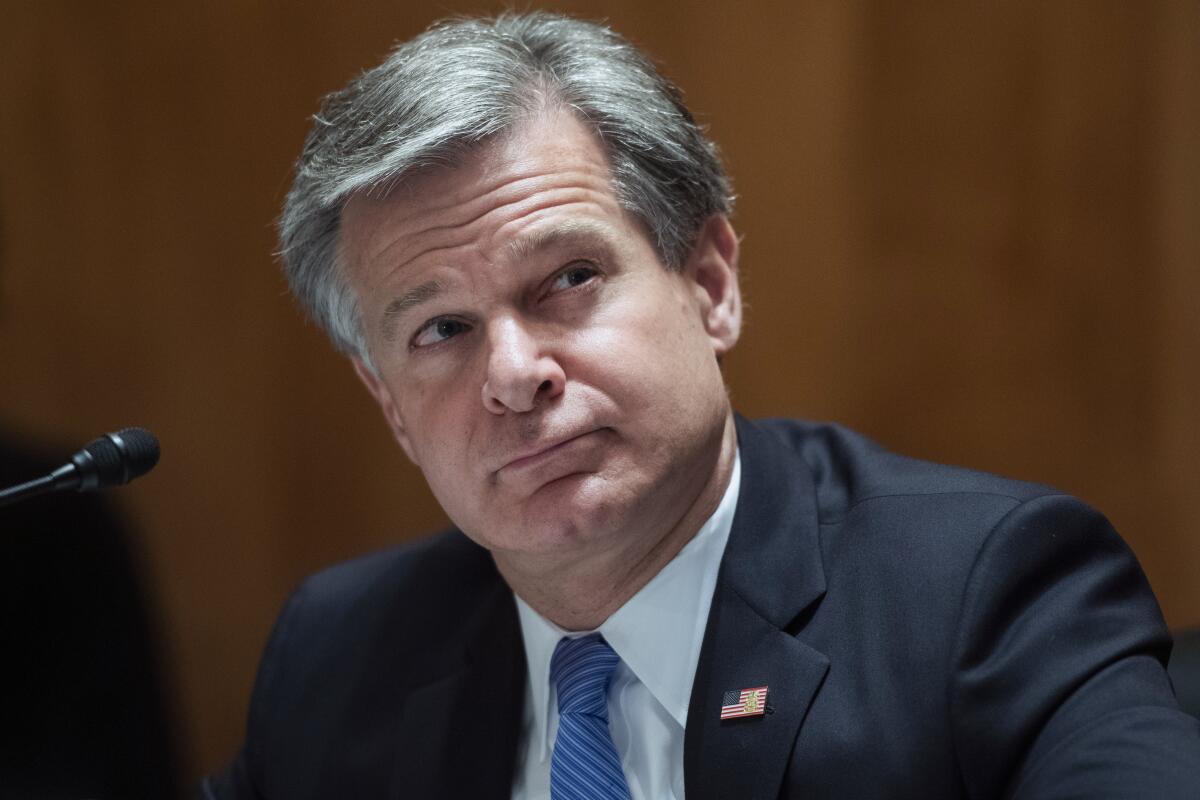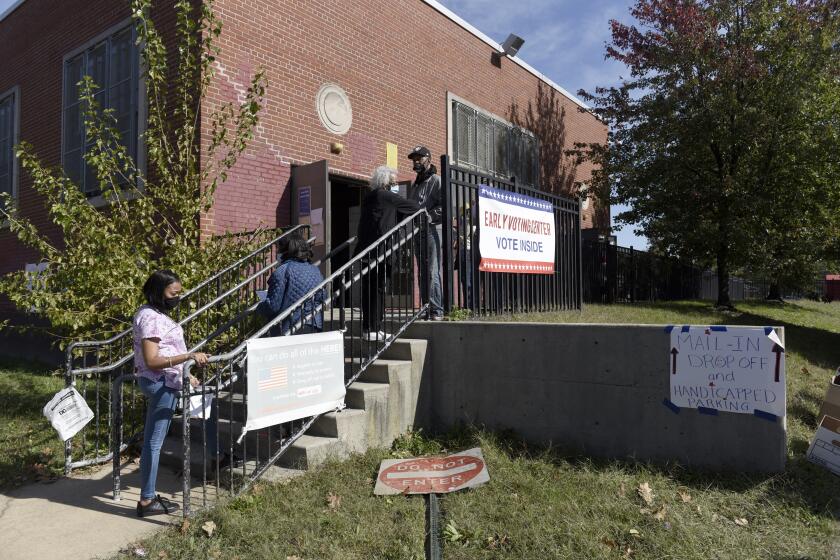Iran and Russia have attempted to influence the U.S. election, officials say

- Share via
WASHINGTON — Iran and Russia have obtained voter registration information and are sending disinformation to Americans ahead of election day, the leaders of U.S. intelligence agencies including the FBI warned on Wednesday night.
The announcement was made during a brief and hastily announced news conference, and it was another reminder of the shadow game that surrounds this year’s presidential campaign. Intelligence officials, federal law enforcement and social media companies have been playing cat-and-mouse with foreign governments that want to tilt the political playing field in their interest or simply create more division in an already hotly partisan atmosphere.
John Ratcliffe, the national intelligence director, said Iran and Russia want to “cause confusion, sow chaos and undermine your confidence in American democracy.”
“These actions are desperate attempts by desperate adversaries,” he added.
Ratcliffe sought to assure Americans that their vote would be counted accurately.
Six Russian military officers sought to disrupt through computer hacking the French election, the Winter Olympics and U.S. businesses, the Justice Department says.
“Our election systems are resilient, and you can be confident that your vote is secure,” he said.
Voter registration information is often publicly or commercially available, so there’s no indication that hacking was involved in the operations mentioned by U.S. officials.
Ratcliffe provided few details on the Iranian operation, but his comments appeared to refer to threatening emails sent to Democratic voters. The messages were purportedly from the Proud Boys, a far-right extremist group, but the organization has denied responsibility, and the Washington Post reported that Tehran was behind the emails.
“This incident marks a fundamental shift in our understanding of Iran’s willingness to interfere in the democratic process,” said John Hultquist, senior director of intelligence analysis at FireEye, a cybersecurity firm. “While many of their operations have been focused on promoting propaganda in pursuit of Iran’s interests, this incident is clearly aimed at undermining voter confidence.”
Ratcliffe said Iran wanted to “damage President Trump” with the spoofed emails, although he did not explain how attempting to intimidate Democratic voters would accomplish that. Trump has faced criticism for his reluctance to denounce the Proud Boys at his first debate with former Vice President Joe Biden, the Democratic nominee.
U.S. intelligence officials previously concluded that Iran “seeks to undermine U.S. democratic institutions, President Trump, and to divide the country in advance of the 2020 elections.”
“Tehran’s motivation to conduct such activities is, in part, driven by a perception that President Trump’s reelection would result in a continuation of U.S. pressure on Iran in an effort to foment regime change,” a report by the director of national intelligence said.
Ratcliffe provided even less information on Russia’s operation, but he said it has not taken similar steps to utilize the voter registration information it obtained.
With the end of a court order that barred Republicans from conducting “ballot security” operations at polling places, fears are growing of voter intimidation and suppression efforts in Democratic strongholds in November.
Moscow is generally believed to have the most active election meddling effort, and intelligence officials say it is spreading disinformation to undermine Biden.
Questions about Russian interference escalated in recent days when the New York Post began reporting on emails that were purportedly sent by Hunter Biden, the former vice president’s son. The Post received the emails from Rudolph W. Giuliani, Trump’s lawyer.
Although Giuliani said he obtained the emails from a laptop abandoned at a Delaware computer shop, he’s previously traveled to Ukraine to dig up dirt on the Biden family, including a meeting with an alleged Russian agent.
FBI Director Christopher A. Wray said at Wednesday’s news conference that “we are not going to tolerate foreign interference in our elections.”
“You should be confident that your vote counts,” he added. “Early, unverified claims to the contrary should be viewed with a healthy dose of skepticism.”
The bipartisan leadership of the Senate Intelligence Committee also urged Americans to be cautious about unconfirmed information that might be circulated by malign actors.
“As we enter the last weeks before the election, we urge every American — including members of the media — to be cautious about believing or spreading unverified, sensational claims related to votes and voting,” Sens. Marco Rubio (R-Fla.) and Mark R. Warner (D-Va.), the chair and vice chairman of the committee, respectively, wrote in a statement.
More to Read
Get the L.A. Times Politics newsletter
Deeply reported insights into legislation, politics and policy from Sacramento, Washington and beyond. In your inbox twice per week.
You may occasionally receive promotional content from the Los Angeles Times.













